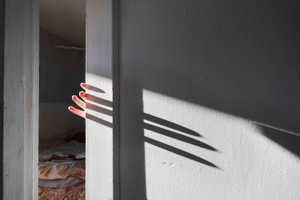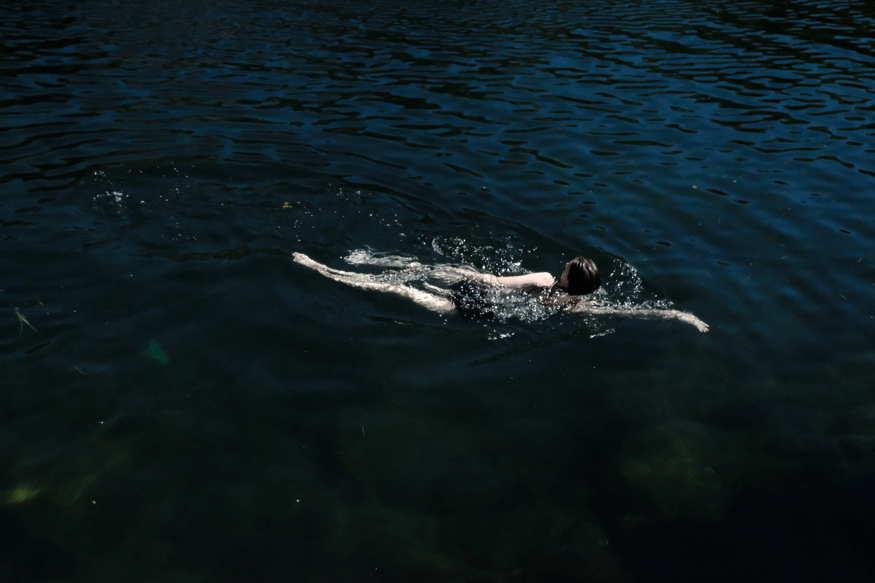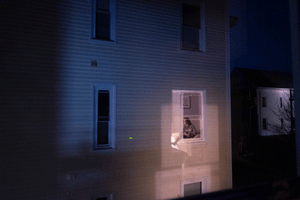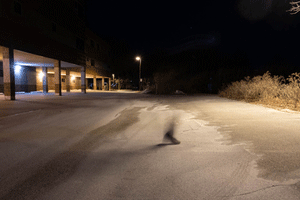Jen Hoffer is a photographer and visual storyteller living in Maine who grew up in New Jersey.
“Dissociation influences my style as a photographer and it can often feel like a really fragmented experience, so that's also something I try to get at a little bit in my work,” Hoffer said in her interview with VICE.
“I took a lot of creative liberties and tried to impart the sensations like the emotional experience of … entering into this sort of state of mind where everything felt really vast and sometimes pointless and I felt really small,” she said in her VICE interview. “I think that photography is sort of a controlled setting for me to work with my dissociation and like kind of work through it because I am looking through a lens and that's sort of the epitome of my frustration with the sensation of dissociation.”


This is a dissociative disorder with two distinct facets: depersonalization and derealization. Both can be quite disturbing.
It might feel like you’re losing your mind, your grip on reality or worse—losing yourself.
The disorder begins usually in the mid-teens or early adulthood and affects approximately 2% of people.
Depersonalization can feel like you aren’t real, like you’re imaginary, like your head is full of cotton or your body is completely empty.
Derealization is when the world doesn’t feel real, like you’re in a fog or in a dream and life around you feels very distant.
Plenty of people, according to the Mayo Clinic, might experience these sensations at some point in their life, due to stress or substances, but for some, it can become a disorder that can interfere with their ability to live and function. The disorder is usually caused by severe stress and trauma or major life stresses.
“I grappled with the duality of being both present and feeling lightyears away at the same time,” she wrote about At Once.

The series is a non-linear compilation of illustrations, photographs and writings.
This non-reality way of being is beautifully shown in her photographs. Alien-like fingers and shadows suggest the eerie feeling of being alien-like yourself.
Others focus on the voyeurism inherent in the condition. Like eavesdropping on a conversation you’re a part of or watching the house from outside while your body wanders around without you.
She wrote on her website:
“I want to emphasize that dissociation can arise when you need to contort your reality in order to function in long-term chaotic circumstances. At the age of fourteen, my fragmented sense of existence and literal sensations of living in a dream or from behind a glass wall were technically my coping mechanisms—but they created a whole other traumatic experience for me.”
It was hard trying to find help: her parents didn’t understand at the time and it took a while to find a diagnosis—a name for this state that was plaguing her.


Other photographs suggest the fragmented nature of perception when your mind’s tool for coping is hiding pieces from yourself. When nothing feels real and time drags by and you’re slugging through a nightmare, but expected to act like the world isn’t being warped around you.
Her photography is stunning and haunting. They suggest separation, seclusion and trauma bleeding into everything we are and the way we experience the world. Her photographs speak to an experience that is almost impossible to talk about.
In May of 2022, her younger brother, Greg Hoffer, took his own life. He had battled with a lifelong mental illness which was resistant to all forms of treatment.
She wished in her update that mental health would become less of a taboo topic and for the world to make more room for neurodivergent people: “It’s a tragedy that my brother couldn’t live to see [such a world], but all I can hope for is that we can make this world inclusive enough for all those who are still here to see a place for themselves in it.”
Hoffer’s photography spreads an important message and aligns with the United Nations Sustainable Developmental Goal for Good Health and Well-Being.
